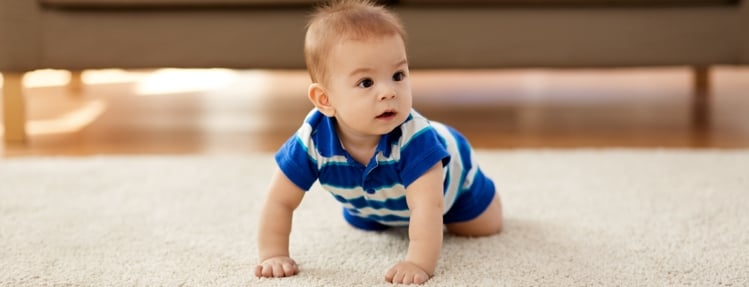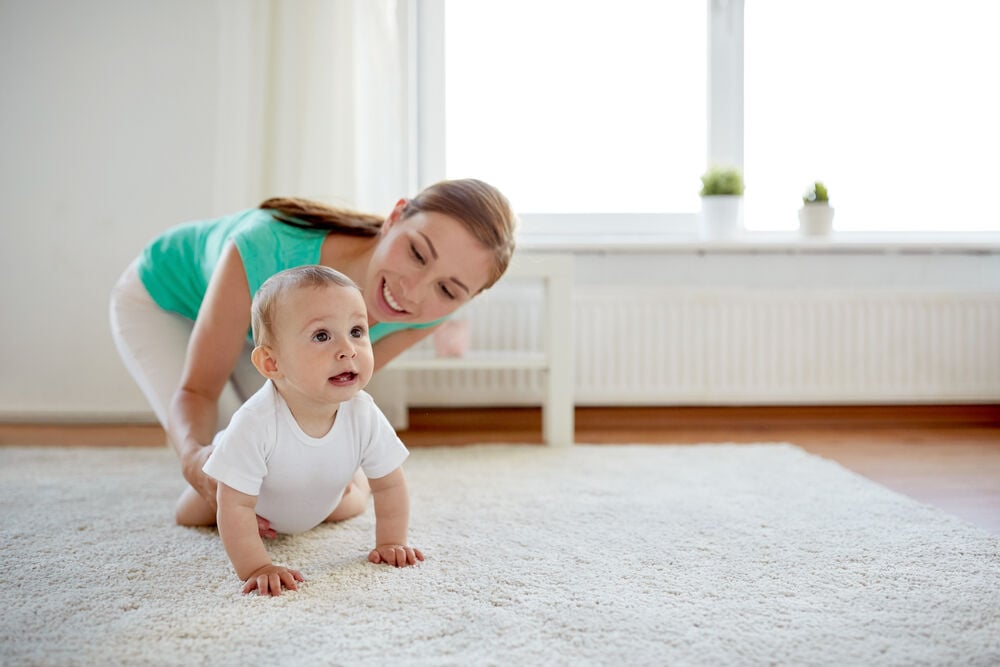-
Tracking cycle
-
Getting pregnant
-
Pregnancy
-
Help Center
-
Flo for Partners
-
Anonymous Mode
-
Flo app reviews
-
Flo Premium New
-
Secret Chats New
-
Symptom Checker New
-
Your cycle
-
Health 360°
-
Getting pregnant
-
Pregnancy
-
Being a mom
-
LGBTQ+
-
Quizzes
-
Ovulation calculator
-
hCG calculator
-
Pregnancy test calculator
-
Menstrual cycle calculator
-
Period calculator
-
Implantation calculator
-
Pregnancy weeks to months calculator
-
Pregnancy due date calculator
-
IVF and FET due date calculator
-
Due date calculator by ultrasound
-
Medical Affairs
-
Science & Research
-
Pass It On Project New
-
Privacy Portal
-
Press Center
-
Flo Accuracy
-
Careers
-
Contact Us
Seven-Month Crawling Milestones: What to Expect


Every piece of content at Flo Health adheres to the highest editorial standards for language, style, and medical accuracy. To learn what we do to deliver the best health and lifestyle insights to you, check out our content review principles.
When do babies usually start crawling?
For young babies, crawling is usually the first activity that gives them some physical autonomy. Typically, a baby will start to crawl when they’re around 7 to 10 months old.
But that doesn’t mean that all babies will learn how to crawl at this point; in fact, some babies never crawl at all! The most important thing is that your baby acquires some form of mobility. While it’s true that most babies do this by crawling, others like to roll, scoot on their bottoms, or slither on their bellies.
Other babies completely skip crawling and go straight to walking. These babies will usually learn how to stand up using an object — like a bed, for example — to support themselves. In fact, crawling is considered to be an “optional skill” that isn’t used to measure your baby’s physical development. Some of the babies who never crawl end up walking earlier than babies who do crawl.
Crawling milestones
Babies don’t simply go from lying on their tummies to crawling with confidence in a matter of days. First, they need to learn how to sit upright without support.
This usually happens when they’re around seven to eight months old. Being able to sit means that their arms, legs, and back are strong enough to support their own weight and prevent them from hitting the floor if they fall down.
Once your baby can sit upright, they’ll learn how to get on all fours. After this, they’ll soon realize that they can rock back and forth in this position and that they can get mobility by pushing their knees off the ground.
With time, your baby will get better at crawling. They’ll be able to return to a sitting position after crawling. When they’re approaching their first birthday, they might learn to “cross-crawl,” which is done by moving their leg and arm on opposite sides, rather than moving both limbs from the same side. “Cross-crawling” provides more balance and speed.
Flo has been invaluable for me while learning about my body and cycle. It helped me to get pregnant after many years of trying unsuccessfully. I recommend this app to anyone who wants to know more about their body or anyone trying to conceive.
How to encourage crawling at 7 months
Even though some babies never crawl, or crawl later than expected, it’s normal to wonder if there’s anything you can do to help your child achieve this milestone.
Research has found that many babies don’t learn how to crawl because they haven’t had enough “tummy time.” This is, as its name suggests, the time babies spend lying on their tummies. Tummy time strengthens your baby’s neck, shoulders, arms, and trunk muscles every time they lift their head and neck to look around.
Meanwhile, your baby will also kick around with their legs and feet, which will strengthen their legs. If you want to make tummy time more interesting and rewarding for your baby, place their favorite toy in front of them. This will encourage them to slither on their bellies or try to crawl to reach the toy. Make sure to stay close by during tummy time to keep your baby from injuring themselves as they develop new muscle strength.
Baby not crawling at 8 months
At this age, the most important thing is that your child is trying to become mobile, even if they aren’t crawling. If your baby is learning to get on all fours and swinging back and forth from this position, this is normal development. Try engaging in more tummy time to further stimulate them.
Baby not crawling at 9 months
Experts agree that some babies are simply more motivated to become mobile, while others are content playing with the toys they can reach. If your baby is reaching other developmental milestones such as standing up with support, there’s usually nothing to worry about.
Baby not crawling at 10 months
By now, your baby could be gearing up to take their first steps. By this age they probably know how to sit up without support and maybe stand up for a few moments. Even if they’re still not crawling, more important are their attempts to start moving around the world. Pretty soon, chasing your baby around will provide a full workout!
How to help your baby start crawling

Take a quiz
Find out what you can do with our Health Assistant
If you want to help your baby start to crawl, try these tips at home:
- Provide more supervised tummy time. Make things more interesting by placing a colorful object, a toy, or even yourself just out of your baby’s reach.
- Figure out what motivates your baby. Some babies won’t move for a toy, but they’ll do anything for their sippy cup. Figure out which objects motivate your baby to get moving.
- Keep your child barefoot. Being barefoot allows your baby’s feet to develop more naturally. Baby shoes are cute, but they can make it more difficult for your baby to feel the floor and gain mobility. As long as you’re indoors, take your baby’s shoes off.
When to see a doctor
It’s perfectly normal for many babies to never crawl. However, if your baby is a year old and hasn’t engaged in any form of self-locomotion (whether it’s crawling, scooting, slithering, or cruising), doesn’t reach other developmental milestones, or seems to favor one side of their body, talk to your pediatrician. Seeking an early diagnosis can improve your baby’s chances of reaching milestones later on.
Parenthood comes with many questions, and it’s exciting to think about when your baby will start crawling or reach other developmental milestones. Remember that most babies will reach all milestones on time. Even if your baby isn’t crawling yet, they’ll probably be running around in no time!


Hey, I'm Anique
I started using Flo app to track my period and ovulation because we wanted to have a baby.


The Flo app helped me learn about my body and spot ovulation signs during our conception journey.


I vividly
remember the day
that we switched
Flo into
Pregnancy Mode — it was
such a special
moment.
Real stories, real results
Learn how the Flo app became an amazing cheerleader for us on our conception journey.




